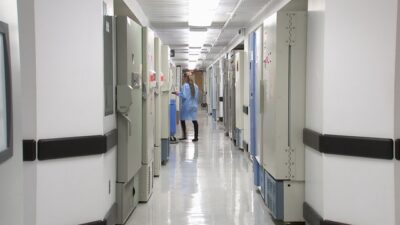Donna Ford suffered a minor fall in her home while getting ready for work. She tripped on an uneven board, lost her balance, and fell on her bottom. The nurse carried on with her normal routine and headed to work at a nursing home in Trinity, Texas, but that was just the beginning of her problems.
“I didn’t feel well,” she told People magazine. After work, she came home and told her husband she needed to go to the hospital.
“I could hear a rushing sound in my ear and my vision was a little bit off,” she recalled. “As a nurse, I knew what those signs were.” But she couldn’t remember hitting her head. Her husband drove her to the ER just to be safe. A subsequent CT scan showed that she had a brain bleed.
The hospital sent her home and told her that her subdural hematoma would heal on its own, but she woke up the next day vomiting, so she called an ambulance back to the ER.
After another CT scan showed the bleed getting worse, Ford was flown to Memorial Hermann Hospital in Houston. That’s when the doctors diagnosed her with acute promyelocytic leukemia. What should’ve been a minor injury escalated into a full-blown medical crisis.
“It was quite a big shock,” Ford said. “I don’t think I would’ve found out about the leukemia as quickly, if I hadn’t fallen.”
Excess bleeding in the brain can be a sign of this type of leukemia, says Ford’s oncologist Dr. Adam Rios.
“This creates an enormous challenge,” says Rios, surgical oncologist with UTHealth Houston and Memorial Hermann. “A surgical intervention in the middle of an early diagnosis of leukemia is a complex process that requires very specialized management.”
Rios and his team couldn’t perform brain surgery because it would have led to brain damage or even possible death, so they used a minimally invasive technique to insert a catheter in an artery in Ford’s thigh and then threaded it to her brain, which “obliterated” the hematoma. Once they had the bleeding under control, Ford started undergoing cancer treatment.
“This leukemia is very unique,” Rios explained. “About 95 percent of these cases, once you start treatment, they end up being cured. The first stage of the diagnosis is critical: If you’re able to get the patient over the acute phase, most of these patients will go on and be cured of their leukemia.”
Ford is in remission after spending a month in the hospital and undergoing four rounds of chemotherapy. Rios said her prognosis is “very good.”
While still in recovery, Ford hasn’t been able to work at the nursing home, so she has been staying home and taking care of her five grandchildren.
“I’m doing a lot better,” she added. “I feel better. I’m not tired like I was. A lot of things made sense to me after getting the diagnosis of the leukemia, the tired feeling and I had some unusual bruising that was going on.”
Ford is encouraging other women to get regular checkups and to trust their instincts when monitoring their own health. “Just don’t give up,” she said, even if the diagnosis is grim.
















